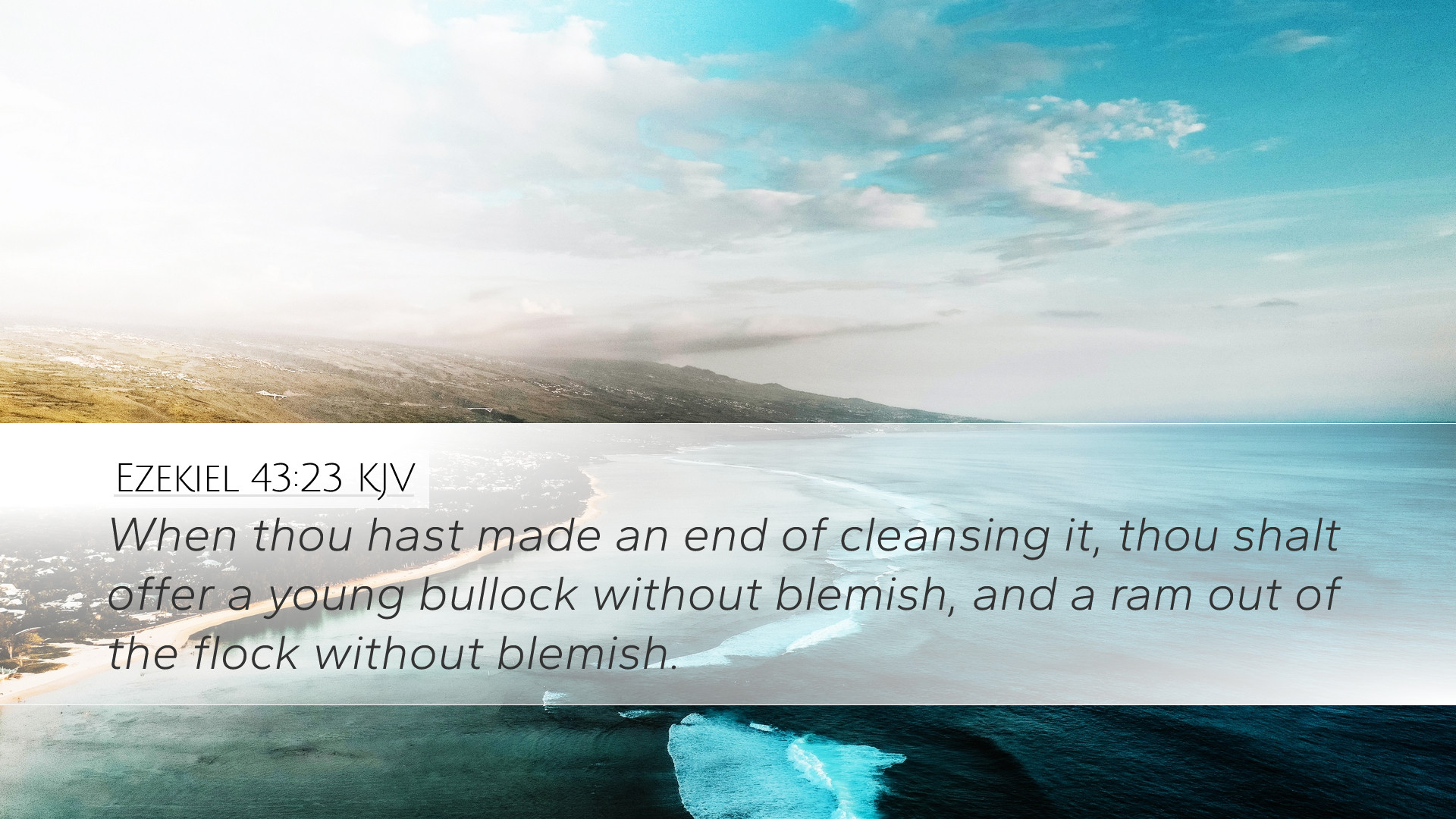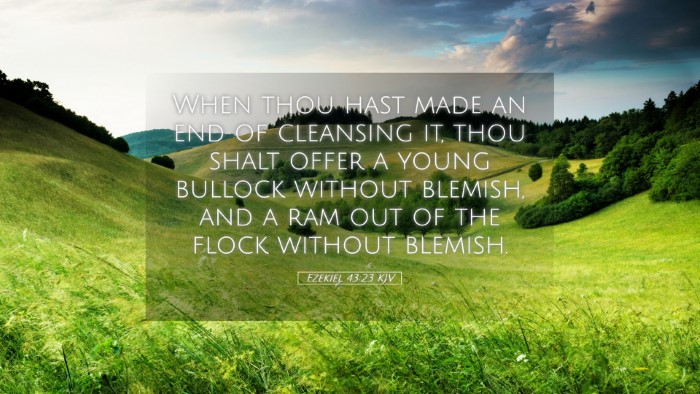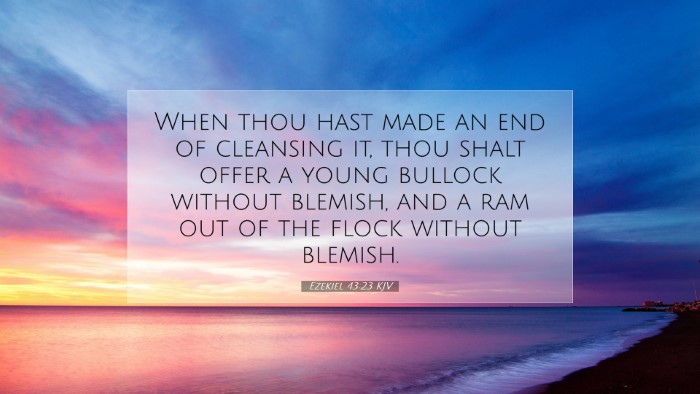Commentary on Ezekiel 43:23
Bible Verse: "And when thou hast made an end of cleansing it, thou shalt offer a young bullock without blemish, and a ram out of the flock without blemish." (Ezekiel 43:23, KJV)
Introduction
The verse Ezekiel 43:23 occurs in a pivotal section of the Book of Ezekiel where the prophet is given a vision of the restored temple and the return of God's glory to His people. This particular verse emphasizes the sacrificial system that was a cornerstone of Hebrew worship and reflects the broader themes of purification and dedication to God.
Contextual Overview
Ezekiel's prophecies are often centered upon themes of judgment and restoration. In Ezekiel 40-48, the prophet details the dimensions and regulations concerning the new temple and the new order of worship in Israel. The repetitive emphasis on sacrifices in these passages signifies not only the need for atonement but also the relationship between God and His covenant people.
Importance of Sacrifice in Worship
As we examine Ezekiel 43:23, it is imperative to consider the significance of the sacrifices mentioned:
- Symbolism of the Bullock and Ram: The young bullock and ram were to be offered without blemish, symbolizing purity and the requirements for acceptable worship. This reflects God's holiness and the people's need for atonement.
- Expectation of Purity: The act of offering sacrifices highlights an essential element of worship - the preparedness of the worshiper’s heart, mind, and body to approach a holy God.
- Covenantal Relationship: The offerings serve as a medium of maintaining the covenant relationship between God and Israel. It signifies devotion and obedience to God as they return to Him in sincere repentance.
Analysis of the Commentary by Various Scholars
Matthew Henry
Matthew Henry's commentary draws attention to the ritual of cleansing the altar and the necessity of sacrifices to sanctify the rituals of worship. He emphasizes that the offering of the bullock and the ram is not merely a formality but a profound act of dedication. It serves the dual purpose of expiating sin and reconciling the people to God.
Albert Barnes
Albert Barnes further elaborates on the sacrificial system and its foundation in the Mosaic Law. He asserts that these offerings reflect God’s unchanging standards for worship and the seriousness with which God views sin. Barnes notes that the emphasis on the unblemished nature of the sacrifices alludes to the ultimate sacrifice—Christ’s atonement—demonstrating the prefigurement of Christ in the sacrificial system prescribed in the law.
Adam Clarke
Adam Clarke highlights that the nature of the sacrifices indicates the significance of atonement and the restoration of worship practices among the Israelites. Clarke’s insights bring to light the theological implications of priestly duties and their role in mediating between God and the people through these sacrificial offerings. He provides an in-depth breakdown of how the sacrificial system points towards the necessity of continual atonement and God's provision for humanity’s reconciliation.
Theological Implications
In light of the scholarly commentaries, several theological implications emerge from Ezekiel 43:23:
- Holiness of God: The requirement for unblemished sacrifices underscores God's holiness and the importance of approaching Him with reverence and awe.
- Nature of Sin: The acknowledgment of sin in the sacrificial system reflects humanity’s fallen state and need for redemption.
- Christological Significance: The imagery in this verse serves as a prelude to understanding Christ’s perfect sacrifice, linking the Old Testament sacrificial laws to New Testament fulfillment in Christ.
- Restoration and Renewal: This verse is part of a restoration narrative, indicating that returning to proper worship leads to renewal of relationship with God, a theme that reflects the broader message of Ezekiel.
Application for Pastors and Theologians
For pastors and theologians, Ezekiel 43:23 serves as a reminder of the sacredness of worship and the preparation required to stand before God. It challenges leaders to cultivate an atmosphere of reverence in contemporary worship settings, aligning practices with biblical teachings on sacrifice and holiness.
Pastoral Applications
- Encouraging Holiness: Pastors can use this teaching to encourage congregations to embrace personal holiness as they approach God.
- Sacrifice and Service: The Church's service should reflect a heart of sacrifice, echoing the unblemished offerings that God asks of His people.
- Teaching on Atonement: This verse presents an opportunity to preach on the significance of atonement in the context of Christ’s finished work and its implications for believers today.
Conclusion
Ezekiel 43:23, with its focus on the sacrificial system, carries immense weight in understanding both the historical context of ancient Israel’s worship and its theological implications for Christians today. By examining the insights from Matthew Henry, Albert Barnes, and Adam Clarke, one can gain a deeper understanding of the gravity of approaching a holy God, the necessity of atonement, and the beauty of Christ’s ultimate sacrifice.


